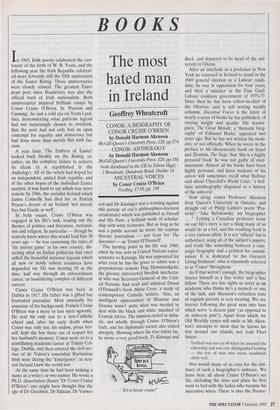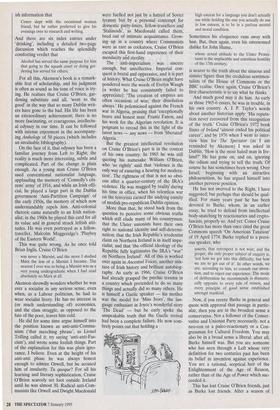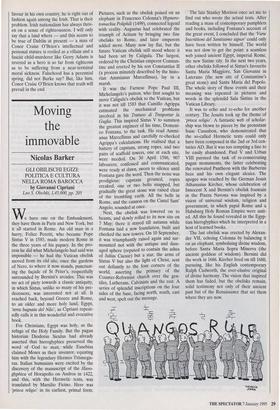BOOKS
The most hated man in Ireland
Geoffrey Wheatcroft
CONOR: A BIOGRAPHY OF CONOR CRUISE O'BRIEN by Donald Harman Aken son McGill-Queen's University Press, £20, pp.574 CONOR: ANTHOLOGY • by Donald Harman Akenson McGill-Queen's University Press, £20, pp.356 both distributed in the UK by Edwin Higel, 2 Brookside, Dundrum Road, Dublin 14. ANCESTRAL VOICES by Conor Cruise O'Brien Poolbeg, £7.99, pp. 198 In 1965, Irish poetry celebrated the cen- tenary of the birth of W. B. Yeats, and the following year the Irish Republic celebrat- ed more fervently still the 50th anniversary of the Easter Rising. Those anniversaries were closely related. The greatest Euro- pean poet since Baudelaire was also the official bard of Irish nationalism. Both anniversaries inspired brilliant essays by Conor Cruise O'Brien. In 'Passion and Cunning', he cast a cold eye on Yeats's pol- itics, demonstrating what patriotic legend had not surprisingly chosen to overlook, that the poet had not only had an open contempt for equality and democracy btit had done more than merely flirt with fas- cism.
A year later 'The Embers of Easter' looked back bleakly on the Rising, or, rather, on the complete failure to achieve its ideals (it is republished in the Anthology). All of the rebels had hoped for an independent, united Irish republic, and of the other hopes of the individual Easter martyrs, it was hard to say which was more remote by 1966, the socialist Ireland which James Connolly had died for or Patrick Pearse's dream of an Ireland 'not merely free but Gaelic as well'.
In both essays, Cruise O'Brien was engaged in his life's task, teasing out the themes of politics and literature, national- ism and religion. In particular — though he scarcely knew where this would lead him 30 years ago — he was examining the rules of `the patriot game' in his own country, dis- secting what an Italian politician had once called the beautiful national legends which all new or newly reborn countries have depended on. He was nearing 50 at the time, half way through an extraordinary career, or bewildering complex of different careers.
Conor Cruise O'Brien was born in Dublin in 1917. His father was a gifted but frustrated journalist. Most unusually for someone of his background, Francis Cruise O'Brien was a more or less open agnostic. He sent his only son to a non-Catholic school and, after his early death when Conor was only ten, his widow, pious her- self, kept the boy there out of respect for her husband's memory. Conor went on to a scintillating academic career at Trinity Col- lege, Dublin, and then entered the civil ser- vice of de Valera's somewhat Ruritanian Irish state during the 'Emergency', as neu- tral Ireland knew the world war.
At the same time he had been making a name as a writer; or two names. He wrote a Ph.D. dissertation (hence 'Dr Conor Cruise O'Brien'; one might have thought that the age of Dr Goebbels, Dr Salazar, Dr Verwo- erd and Dr Kissinger was a warning against this parade of one's philosophico-doctoral credentials) which was published as Parnell and His Party, a brilliant work of scholar- ship with witty footnotes. But as long as he was a public servant he wrote his copious literary journalism — not least for The Spectator — as `Donat O'Donnell'. The turning point in his life was 1960, when he was sent as United Nations repre- sentative to Katanga. He was appointed for what even he has the grace to admit was a preposterous reason: Dag Hammarskjold, the gloomy, introverted Swedish intellectu- al who was Secretary-General of the Unit- ed Nations, had read and admired Donat O'Donnell's book Maria Cross, a study of contemporary Catholic writers. Alas, an intelligent appreciation of Mauriac and Greene wasn't quite what was needed to deal with the black and white mischief of Central Africa. The mission ended in deba- cle, not wholly through Cruise O'Brien's fault, and his diplomatic career also ended abruptly. Showing where his true talent lay, he wrote a very good book, To Katanga and It's a booze cruise!' Back, and departed to be head of the uni- versity in Ghana.
After an interlude as a professor in New York he returned to Ireland to stand in the 1969 general election as a Labour candi- date; he was in opposition for four years, and then a minister in the Fine Gael- Labour coalition government of 1973-77. Since then he has been editor-in-chief of the Observer, and is still writing weekly columns. Ancestral Voices is the latest of nearly a score of books he has published, of varying weight and quality. His master- piece, The Great Melody, a 'thematic biog- raphy' of Edmund Burke, appeared two years ago. But he has not written his mem- oirs; or not officially. When he wrote in the preface to his idiosyncratic book on Israel and Zionism, The Siege, that 'this is a highly personal book' he was not guilty of over- statement. Almost all his books have been highly personal, and keen students of his oeuvre will sometimes recall what Balfour said about Churchill's World Crisis, 'a bril- liant autobiography disguised as a history of the universe'.
Now along comes Professor Akenson from Queen's University in Ontario, and straight out of Philip Larkin's poem 'Pos- terity': 'Jake Balokowsky, my biographer . . . ' Letting a Canadian professor loose on our life's story is not a thing many of us would do as a bet, and the resulting book is a very curious affair. It is not 'official' but is authorised, using all of the subject's papers, and reads like something between a cam- paign biography and a petition for canoni- sation. It is dedicated `to the Greatest Living Irishman', who is chummily referred to as 'Conor' throughout.
As if that weren't enough, the biographer fancies himself as a fine writer and a fine fellow. There are few sights so sorry as an academic who thinks he's a mensch or one of the lads, and Akenson's relentless tone of roguish jocosity is very wearing. We are forever following the great man into bars which serve 'a decent pint' (as opposed to an indecent pint?). Apart from which, we Old Worldly cynics will smile. at Mr Aken- son's attempts to show that he knows his way around our islands, not least Fleet Street:
Trelford was not yet 40 when he assumed the editorship and was very distinguished looking — the sort of man who wears handmade shirts well.
Nor would many of us care for the inti- macy of such a biographer's embrace. We learn here all about Cruise O'Brien's sex life, including the time and place he first went to bed with the ladies who became his successive wives. There is also the Pooter- ish information that
Conor slept with the occasional woman friend, but he rather preferred to give his evenings over to research and writing.
And there are six index entries under `drinking', including a detailed two-page discussion which reaches the splendidly comforting verdict that
Alcohol has served the same purpose for him that going to the squash court or doing gar- dening has served for others.
For all this, Akenson's book is a remark- able feat of scholarship, and his judgment is often as sound as his tone of voice is try- ing. He realises that Cruise O'Brien, gar- dening substitute and all, 'went to the good' in the way that so many Dublin writ- ers have gone to the bad. His life has been an extraordinary achievement; there is no more fascinating, or courageous, intellectu- al odyssey in our time. It can be followed with intense enjoyment in the accompany- ing Anthology of 50 pieces (which includes an invaluable bibliography).
On the face of it, that odyssey has been a familiar journey from Left to Right; the reality is much more interesting, subtle and complicated. Part of the change is plain enough. As a young man Cruise O'Brien used conventional nationalist language, applauding the memory of 'Connolly's citi- zens' army' of 1916, and while an Irish offi- cial, he played a large part in the Dublin government `Anti-Partition Campaign' of the early 1950s, the memory of which now understandably repels him. Anti-colonial rhetoric came naturally to an Irish nation- alist; in the 1960s he played this card for all its value and in general struck leftish atti- tudes. He was even portrayed as a fellow- traveller, Malcolm Muggeridge's 'Playboy of the Eastern World'.
This was quite wrong. As he once told Brian Inglis, Cruise O'Brien
was never a Marxist, and the more I studied Marx the less of a Marxist I became. The nearest I ever was to being a Marxist was as a very young undergraduate when I had read absolutely no Marx at all.
Akenson shrewdly wonders whether he was ever a socialist in any serious sense, even when, as a Labour politician, he had to wear socialist livery. He has no interest in (or much understanding of) economics, and the class struggle, as opposed to the fate of the poor, leaves him cold.
He did for some time argue himself into the position known as anti-anti-Commu- nism (`that meeching phrase', as Lionel Trilling called it; try saying 'anti-anti-Fas- cism), and wrote some foolish things. Part of the explanation for this was plain igno- rance, I believe. Even at the height of his anti-anti phase he was always honest enough to admire Orwell, but he accused him of insularity. Tu quoque? For all his learning and literary sophistication, Cruise O'Brien scarcely set foot outside Ireland until he was almost 30. Radical anti-Com- munists like Orwell and Dwight Macdonald were fuelled not just by a hatred of Soviet tyranny but by a personal contempt for domestic party-liners, fellow-travellers and `Stalinoids', as Macdonald called them, bred out of intimate acquaintance. Grow- ing up in a country where Communists were as rare as cockatoos, Cruise O'Brien escaped this first-hand experience of their mendacity and sterility.
The anti-imperialism was sincere enough, but unreflective. Imperial con- quest is brutal and oppressive, and it is part of history. What Cruise O'Brien might have pondered were the words of Evelyn Waugh (a writer he has consistently failed to appreciate): 'The creation of empires are often occasions of woe; their dissolution always.' He polemicised against the French war in Algeria, praising that 'exceptionally brave and honest man' Frantz Fanon, and his work for the Algerian revolution. It is poignant to reread this in the light of the latest news — any news — from `liberated' Algeria.
But the greatest intellectual revolution on Cruise O'Brien's part is in the context of his own country. In 1965 he was still quoting his namesake William O'Brien, who `so rightly' said that `violence is the only way of ensuring a hearing for modera- tion'. The rightness of that is not so obvi- ous after a quarter-century of the IRA's violence. He was mugged by reality during his time in office, when his relentless war on the terrorists earned the undying enmity of modish pro-republican Dublin opinion.
More than that, he stood back from the question to perceive some obvious truths which still elude many of his countrymen: that the Ulster unionists have their own right to national identity and self-determi- nation; that the Irish Republic's irredentist claim on Northern Ireland is in itself impe- rialist; and that 'the official ideology of the Republic fully legitimates the IRA's "war" on Northern Ireland'. All of this is worked over again in Ancestral Voices, another mix- ture of Irish history and brilliant autobiog- raphy. As early as 1966, Cruise O'Brien had already grasped the psychic trauma in a country which pretended to do so many things and actually did so many others. He is himself a Gaelic speaker — his mother was the model for 'Miss Ivors', the lan- guage enthusiast in Joyce's wonderful story The Dead' — but he early spoke the unspeakable truth that the Gaelic revival had been a complete failure. He now som- brely points out that holding a
high esteem for a language you don't actually use while holding the one you actually do use in low esteem, is to be in a parlous mental and moral condition.
Sometimes his eloquence runs away with him. But, then again, even his envenomed dislike for John Hume,
whose actual attitude to the Ulster Protes- tants is the implacable and relentless hostility of the 17th century,
is nearer to the truth about the sinuous and sinister figure than the credulous sentimen- talists of the House of Commons or the BBC realise. Once again, Cruise O'Brien's first characteristic is to say what he thinks.
And much good may it do him. As early as those 1965-6 essays, he was in trouble, in his own country. A. J. P. Taylor's words about another historian apply: 'His reputa- tion never recovered from this recognition of the truth.' Cruise O'Brien's 1972 book States of Ireland 'almost ended his political career', and by 1976 when I went to inter- view him for The Spectator (as I am reminded by Akenson) I was asked in Dublin, 'How is the most hated man in Ire- land?' He has gone on, and on, ignoring the odium and trying to tell the truth. Of course he has sometimes been wrong. Over Israel, beginning with an attractive philosemitism, he has argued himself into another perverse position.
He has not swerved to the Right, I have suggested; but perhaps that should be qual- ified. For many years past he has been devoted to Burke, whom, in an earlier essay, he tried to defend from intellectual body-snatching by reactionaries and crypto- fascists, properly so. And yet: Conor Cruise O'Brien has more than once cited the great Commons speech 'On American Taxation' of 19 April 1774. Burke replied to a previ- ous speaker, who
asserts, that retrospect is not wise; and the proper, the only proper subject of enquiry is, `not how we got into this difficulty, but how we are to get out of it'. In other words, we are, according to him, to consult our inven- tion, and to reject our experience. The mode of deliberation he recommends is diametri- cally opposite to every rule of reason, and every principle of good sense established amongst mankind.
Now, if you revere Burke in general and quote with approval that passage in partic- ular, then you are in the broadest sense a conservative. Not a follower of the Conser- vative and Unionist Party necessarily, not a neo-con or a paleo-reactionary or a Con- gressman for Cultural Freedom. You may also be in a broad sense a liberal: after all, Burke himself was. But you are someone who has seen through a Left whose very definition for two centuries past has been its belief in invention against experience. You are a rational, sceptical heir of the Enlightenment of the Age of Reason, rather than of the Age of Power which suc- ceeded it.
This has lost Cruise O'Brien friends, just as Burke lost friends. After a season of favour in his own country, he is right out of fashion again among the Irish. That is their problem. Irish nationalism has always thriv- en on a sense of righteousness. I will only say that a land where — and this seems to be true of Dublin at present — a man of Conor Cruise O'Brien's intellectual and personal stature is reviled as a villain and a fascist child-murderer like Gerry Adams is revered as a hero is so far from righteous as to be suffering from a near-terminal moral sickness. Falsehood has a perennial spring, did not Burke say? But, like him, Conor Cruise O'Brien knows that truth will prevail in the end.




















































 Previous page
Previous page